Urban Agriculture
 Cornell Cooperative Extension's Urban Agriculture program provides support for urban agriculture in all five boroughs of New York City and across the state. With an emphasis on growing for market, we serve urban farmers through educational programming, technical assistance, and research. Our program areas include production, marketing, regulations, food safety, and urban agriculture's social and environmental impacts. Reach out to the Urban Agriculture team:
Cornell Cooperative Extension's Urban Agriculture program provides support for urban agriculture in all five boroughs of New York City and across the state. With an emphasis on growing for market, we serve urban farmers through educational programming, technical assistance, and research. Our program areas include production, marketing, regulations, food safety, and urban agriculture's social and environmental impacts. Reach out to the Urban Agriculture team:Sam Anderson, Urban Agriculture Specialist
Yolanda Gonzalez, Urban Agriculture Specialist
Karen Guzman, NYC Urban Gardens Specialist
Mallory Hohl, Western NY Urban Gardens Specialist
Kwesi Joseph, NYC Urban Gardens Specialist
The Cornell Cooperative Extension Urban Agriculture Program offers an email publication, NYC Urban Growers Update. This occasional publication is focused on production-oriented resources for NYC urban farmers who are growing for market or growing at a similar scale.
Join the NYC CRAFT Google Group to stay informed on all Collaborative Regional Alliance for Farmer Training events happening in our area. NYC CRAFT is a cooperative model encouraging enhanced educational and networking opportunities for farmers across the NYC region.
For more frequent updates on our work:
Relevant Events
The Urban Farmer-to-Farmer Summit (TUFFS) 2026
February 4, 2026
2:30 pm - 5:00 pm
New York, NY
Pruning & Fruit Tree Health 101 (Flushing, NY)
February 22, 2026
11:00 AM - 1:00 PM
Flushing, NY
NYC Urban Growers Update
The NYC Urban Growers Update is an occasional email publication focused on production-oriented resources for NYC urban farmers who are growing for market or growing at a similar scale (e.g. nonprofit farms growing for food banks). Updates and announcements from the Cornell Cooperative Extension Urban Agriculture Program are provided too.
Management Practices for High Organic Matter Soils: Urban Case Studies
Sam Anderson, Urban Agriculture Specialist
Harvest New York
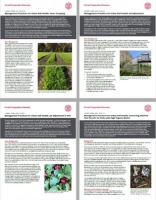
We are exploring management practices for vegetable farmers with high organic matter soils. These soils are usually found in urban growing areas as urban farmers typically grow in imported soil mixtures that have been constructed over time and in high tunnels where leaching events are limited. In both cases, we see that soil pH and calcium levels can increase due to alkaline irrigation water and with grower inputs such as high levels of compost and/or fertilizer. We commonly see limited plant nutrient uptake due to high soil pH. We have produced five "Management Practices for Urban Soil Health" case studies sharing project updates in our urban cover crop, pH adjustment, and bulk density adjustment work. In each case study, we are looking at the effect of the management practice on soil and crop health.
Urban Farm Soil Test Interpretation
Sam Anderson, Urban Agriculture Specialist
Harvest New York
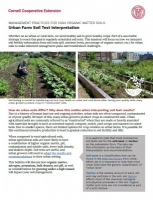
Cornell Cooperative Extension is researching best practices for managing soil health on urban farms. Whether on an urban or rural farm, we need healthy soil to grow healthy crops. Part of a successful strategy to reach this goal is regularly scheduled soil tests. This bulletin focuses on how we interpret fertility information from soil tests for urban soils to make informed management plans and troubleshoot challenges.
Community Gardens Soil Testing Program
Mallory Hohl, Urban Gardens Specialist
Harvest New York
Soil testing supports the growth and expansion of community gardens by protecting the health and safety of the food produced in these gardens. CCE Harvest NY, in partnership with the NYS Department of Agriculture & Markets (AGM) and the Cornell Soil Health Lab, is offering eligible, food-producing gardens in New York State the opportunity to send soil samples for testing without charge.
New York Urban Farms Sustainable Pest Management Fact Sheet Series
Lori Koenick, Extension Support Specialist
Harvest New York
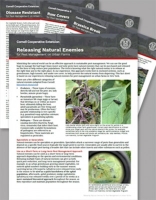
Cornell Cooperative Extension has partnered with dozens of urban farms across New York State to demonstrate and evaluate sustainable pest management strategies. Together with farmers, we found success using control methods that prevent or reduce crop losses through exclusion strategies, crop timing, host resistance, the introduction of beneficial organisms, and more. Regardless of management strategy used, common requirements for success include a knowledge of the pest and disease complex, preventative deployment and commitment to the process. We've developed a set of fact sheets with case studies highlighting pest management techniques that New York urban farms have found valuable. The fact sheets are available in English, Arabic, Chinese, and Spanish.
- Disease Resistant Crop Varieties
- Row Covers
- Releasing Natural Enemies
- Brassica Break
New York State Urban Growers Pest Management Needs Assessment
Sam Anderson, Urban Agriculture Specialist
Harvest New York
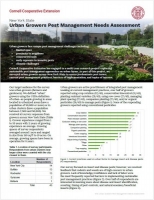
As part of a multi-year project exploring non-spray pest management options that are economically and environmentally sustainable for urban farms, we conducted a needs assessment with urban growers across New York State. This publication presents findings on current pest management practices, challenges, and topics of future interest.
USDA Initiatives Available to Urban Growers in New York
Kyle Karnuta, Urban Ag Curriculum Development Specialist
Harvest New York
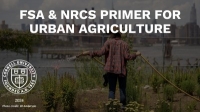
In partnership with the Farm Service Agency (FSA) and Natural Resources Conservation Service (NRCS), Cornell Cooperative Extension's Harvest New York team hosted a free webinar in Spring 2024 to summarize key USDA initiatives available to urban growers in New York. The webinar is relevant to a diverse audience, including Cornell Cooperative Extension educators, urban growers, and USDA staff. The webinar recording provides an introduction to two United States Department of Agriculture (USDA) agencies: the Farm Service Agency (FSA) and Natural Resources Conservation Service (NRCS) as well as a summary of agency programs and initiatives that may benefit urban growers in New York. The webinar ends with a brief Q&A. Slides are available to download and include links to additional resources.
Field Guide: Arthropod Pests of NYC Vegetables
Sam Anderson, Urban Agriculture Specialist
Harvest New York
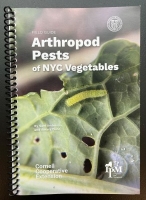
Arthropod Pests of NYC Vegetables aims to help urban farmers and gardeners find, identify, and understand the most common and important insects and other arthropod pests found in New York City farms and gardens. Some of these pests are rarely mentioned in other guides but are common in NYC. The guide emphasizes scouting tips, including how to identify pests by the damage they leave behind, even when you can't find the insect itself.
Urban Agriculture in New York State
Yolanda Gonzalez, Urban Agriculture Specialist
Harvest New York
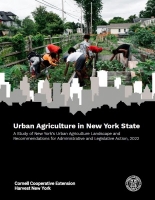
Urban Agriculture in New York State: A Study of New York's Urban Agriculture Landscape and Recommendations for Administrative and Legislative Action, 2022
This report examines urban agriculture across New York State to create a snapshot of the industry and to provide policy recommendations to maximize the benefits of urban agriculture. In partnership with the New York Department of Agriculture and Markets (NYSDAM), the Harvest NY Urban Ag team identified the major forms of urban agriculture currently practiced in urban centers across the state and the impacts that urban agricultural practices and markets have on access to locally grown food, job creation, education opportunities, and the environment. The study concludes with recommendations for legislative and administrative action from urban agriculture practitioners to further advance urban agriculture as it is practiced across the state.
How to Create Habitat for Beneficial Insects
Yolanda Gonzalez, Urban Agriculture Specialist
Harvest New York
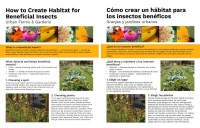
The How to Create Habitat for Beneficial Insects factsheet will teach you what attracts and keeps beneficial insects on your urban farm or garden.
Beneficial insects include a diverse collection of pollinators — not just honey bees — as well as flies, wasps, beetles, bugs and other insects that kill pests. While not technically insects, spiders and predatory mites also serve as natural enemies of pests.
---------------------------
La hoja informativa Cómo crear un hábitat para los insectos benéficos le enseñará lo que atrae y mantiene a los insectos benéficos en su granja o jardín urbano.
Beneficial Insects on NYC Farms Pocket Guide
Sam Anderson, Urban Agriculture Specialist
Harvest New York
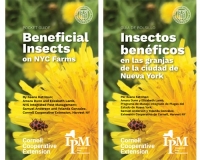
The Beneficial Insects on NYC Farms Pocket Guide provides information on beneficial insects commonly found on New York City farms as well as how to recognize and identify them.
Beneficial insects in this guide refers to natural enemies of pests as well as pollinator insects, like bees.
---------------------------
Esta guía brinda información sobre los insectos benéficos que se encuentran comúnmente en las granjas de la ciudad de Nueva York, así como también cómo reconocerlos e identificarlos.
Guide to Farming in New York State Available in English and Spanish
Yolanda Gonzalez, Urban Agriculture Specialist
Harvest New York
For nearly two decades, the Guide to Farming in New York State has been the Cornell Small Farms Program's go-to resource for those looking to start a farm business, and has been referenced by both new and experienced farmers alike! As a living document, the guide is regularly updated and is a valuable reference material for CCE educators, ag service providers, and farmers throughout New York State and beyond. The guide includes straightforward and readable fact sheets that summarize key information, and points readers toward other local and state resources, to leverage opportunities and answer key questions for farmers.
It is important to make this information accessible to all farmers, including our Spanish-speaking farm owners, supervisors, and employees, whose contributions are vital to NYS agricultural sectors and will define the future of the NYS food system. The decision to create a Spanish language version of the guide, called "Guia para Granjas en Nueva York," is part of a larger effort to promote greater access to agricultural information and opportunities and support new and beginning Latino/a/x farmers to overcome challenges to access land and create successful farm business.
Vegetable Planting Guide for the New York City Area
Yolanda Gonzalez, Urban Agriculture Specialist
Harvest New York
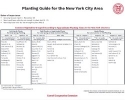
This handy table lists common vegetables grouped by the approximate planting times in the New York City area. Find out what crops will fare well in early Spring plantings, late Spring or early Summer plantings, or that are hardy enough to be planted in late Summer or in the Fall.
NYC Agricultural Soil Survey
Sam Anderson, Urban Agriculture Specialist
Harvest New York
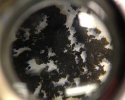
In order to better understand the unique soils used in New York City's urban farms, Cornell Cooperative Extension's (CCE) urban agriculture program is conducting the NYC Survey of Agricultural Soils.
Expanding Specialty Mushroom Production on Urban and Rural Farms
Yolanda Gonzalez, Urban Agriculture Specialist
Harvest New York
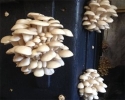
As a response to the growing demand for both mushrooms and technical production knowledge, Yolanda Gonzalez, Urban Agriculture Specialist from Harvest NY, and the Cornell Small Farms Program, along with partners Farm School NYC, Just Food, and Grow NYC, were recently awarded two multi-year grants. The first grant is the USDA NIFA Grant "Expanding Specialty Mushroom Production on Urban and Rural Small Farms," which will engage growers, service provider organizations, and industry partners to enhance the collective knowledge base and capacity of farmers to grow specialty mushrooms and sell them profitably to local and regional markets within 250 miles of New York City. The second grant is the Northeast SARE Professional Development Program "Spawning a network of northeast mushroom educators serving urban and rural farmer audiences," increasing the educational capacity through a network of Community Mushroom Educators throughout the region.
NYC Urban Agriculture Website
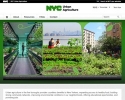
The City of New York created a website in 2018 devoted to urban agriculture resources and questions. The website summarizes New York City programs and regulations urban farms and gardens and provides key contacts within city government and for other service providers.
Cornell High Tunnels
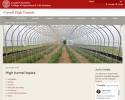
Soil-based urban growers around the country are increasingly adding high tunnels to extend the season, expand which crops they can grow, and ramp up production in small spaces. The Cornell High Tunnels site includes excellent resources on buying and building the structures, figuring out the economics of adding a high tunnel, and guides for growing vegetables, fruit, and flowers.
Controlled Environment Agriculture
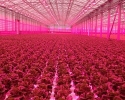
Controlled Environment Agriculture (CEA) is an advanced and intensive form of hydroponically-based agriculture. Plants are grown within a controlled environment so that horticultural practices can be optimized.
CEA techniques are not simpler than older systems for growing plants. Indeed, they demand sound knowledge of chemistry, horticulture, engineering, plant physiology, plant pathology, computers and entomology. A wide range of skills as well as a natural inclination to attend to details are necessary for a person to operate a successful CEA production in either a research or commercial setting.
Guide to Urban Farming in New York State
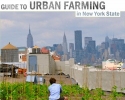
Are you interested in or currently farming in a city? Do you wonder how to access land, how to reclaim a contaminated site, how to maximize use of a small growing space, or how to most successfully target your urban market?
The Guide to URBAN Farming in NYS, produced by the Cornell Small Farms Program, answers these and many other common questions about farming in urban environments, and can help you launch, continue, or expand your urban farm business.
Healthy Soils, Healthy Communities
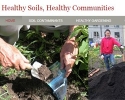
The Healthy Soils, Healthy Communities project is a research and education partnership with New York's urban gardeners and others interested in healthy gardening. We help people make more informed decisions to address concerns about lead and other contaminants in gardens, farms, and other community spaces.
The Healthy Soils, Healthy Communities website includes information on soil contaminants (including soil testing), healthy gardening practices, compost (at home and in gardens, schools, and other community spaces), and other resources.
USDA's Urban Agriculture Toolkit
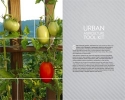
USDA's Urban Agriculture Toolkit is an electronic document that helps urban and small farms navigate more than 70 helpful resources, including technical assistance and financing opportunities. It focuses on some of the most pressing challenges confronting urban producers such as land access, soil quality, water resources, capital and financing, infrastructure, market development, production strategies, and applying for federal, state or private foundation grants. University extension service partners in Chicago and Indianapolis helped develop cost estimates for starting urban farms and the toolkit includes information on best practices and check lists for start-ups and early-stage producers planning outdoor or indoor operations.
Upcoming Events
Whole Farm Climate Adaptation and Mitigation Planning (CAMP) Series
January 27 - February 17, 2026
Jan 27, Feb 3, Feb 10, Feb 17 | 11:30 am - 1:00 pm
The Urban Farmer-to-Farmer Summit (TUFFS) 2026
February 4, 2026
2:30 pm - 5:00 pm
New York, NY
Pruning & Fruit Tree Health 101 (Flushing, NY)
February 22, 2026
11:00 AM - 1:00 PM
Flushing, NY
Announcements
2025 Year in Review
2025 was another year of growth and accomplishment for CCE Harvest NY! Our 2025 Year in Review highlights our impacts and details our work.- Farm to School Local Procurement by the Numbers
- Biochar in the NYC Urban Agriculture Landscape
- Harvest New York Supports Farmer-Led Research Advancing Upland Rice Production in New York State
- Community Garden Soil Testing Program Yields Great Results
- Regional Roots: Culinary Training to Enhance School Meals with Local Foods
- Rooted in Learning: Strengthening Farm to School Connections Across New York
- South Lawn Farm Expands Fresh Food Access and Urban Farming Opportunities
- NYS Summit Advances the Mushroom Industry
- Research to Manage Pests in Blueberries with Less Sprays
- Building a Research and Extension Hub at Brooklyn Botanic Garden
- A Successful Community Garden Leadership Program Pilot
- Farm to School Events Deliver Education, Culinary Training, and Business to Business Opportunities
- A Trusted Source of Science-Based Information for the Cannabis sativa Hemp Industry
- Sustainable Pest Management for New York Urban Farmers
- Cultivating Resilience: Harvest New York Drives the State's Climate Goals Through Research and Outreach
- Expanding Agritourism Outreach Across New York State
- Coordinating City Agencies, Academia, and Community Gardens to Improve Urban Soils
- USDA Urban Agriculture Training Development Complete
